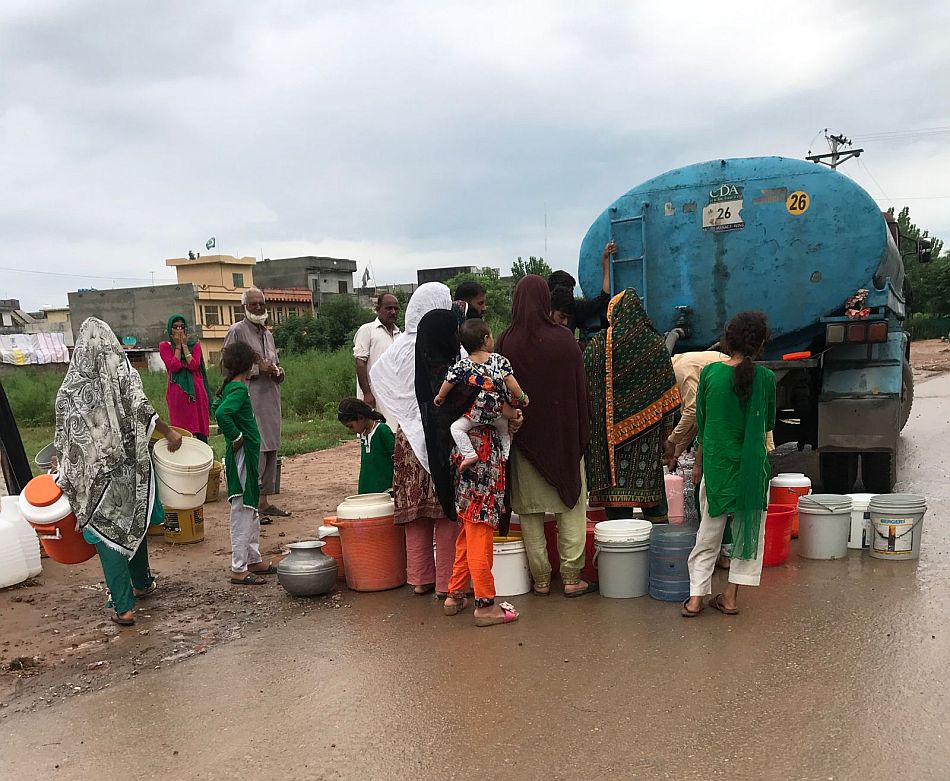By Sidra Khalid, Researcher – Gender and Social Inclusion, IWMI Pakistan

Water, an essential resource for life, is intricately intertwined with an often overlooked and taboo topic: Menstrual Hygiene Management (MHM). In many parts of the world, MHM remains hidden, stigmatized, and ignored, despite its crucial links to health, education, empowerment, and livelihood outcomes. Estimates suggest that around 500 million women and girls* lack access to adequate facilities, clean water, or sanitary products to practice MHM.
Global Menstrual Hygiene (MH) Day, observed annually on 28 May, serves to raise awareness about the need for effective MHM and encourage decision-makers to integrate MHM into policy agendas. Specifically, MHM (or sometimes Menstrual Health and Hygiene) refers to a range of actions and interventions that ensure that those who menstruate can manage their menstruation privately, safely, and hygienically with confidence and dignity. This includes having access to clean water, soap, and safe sanitation and disposal facilities. Unfortunately, many women and girls worldwide face barriers in achieving effective MHM, leading to adverse health consequences, social stigmatization, limited opportunities for education and empowerment, and even environmental pollution.
While MHM is directly linked to the water sector as it underscores the importance of water access, quality, and management, there is limited recognition and integration of MHM into water agendas. One major gap is the stigma surrounding menstruation and unavailability of adequate gender-disaggregated water data, including MHM-related indicators in water, sanitation, and hygiene (WASH) programs.
To address this gap and promote more inclusive and gender-sensitive evidence-building, International Water Management Institute (IWMI) Pakistan recently conducted a comprehensive community WASH survey in two disadvantaged urban communities in Islamabad and Rawalpindi, Pakistan. The survey was conducted under the Australia Pakistan Water Security Initiative (APWASI), a multi-year urban water resilience project funded by Australian Aid and led by WWF-Pakistan with IWMI Pakistan and Hydrology and Risk Consulting (HARC) as implementing partners.
A total of 560 respondents (280 men and 280 women) were surveyed about their drinking water, domestic water use, sanitation and hygiene, community water issues and awareness, and scored on the Individual Water Insecurity Experiences Scale (IWISE). The survey also included a section on MHM for female respondents, of which a total of 208 women responded.
Preliminary findings reveal important insights on the extent to which MHM and women’s well-being is affected by water access, quality, and infrastructure:
- Nearly 40% of women faced challenges managing their period due to water-related issues, causing stress and difficulty.
- Around 25% of women reported limited access to water for body washing during their period, while only 46% reported consistent availability.
- Just over half of the women reported having access to clean water, indicating that a significant number were using unsafe water for intimate hygiene, putting them at risk of infections and water-borne illnesses.
- Analysis revealed that women categorized as Water Secure (76% of respondents) under IWISE Scale classification were more likely to have access to clean water for managing their period compared to those classified as Water Insecure (46%), highlighting an important correlation between water security and MHM.
- Women who found it easier to manage their period were more likely to have an improved water source in their homes, whereas those facing difficulties were more likely to have an unimproved water source, highlighting another important correlation between water source and ability to practice MHM.
- Inside their homes, nearly 60% of women reported always being able to manage their period easily, but this percentage dropped significantly to only 29% in public spaces. Additionally, a higher proportion of women reported never being able to manage their period easily in public spaces (37%) compared to inside their homes (20%). These findings suggest that public water and sanitation facilities – like many public spaces – are not MHM-friendly and often designed with men in mind and overlook women’s needs.
These survey findings have significant implications for Pakistan’s water landscape. Millions of people experience menstruation and their MHM needs cannot be ignored. The study illustrates the importance of recognizing the unique water needs of men and women and collecting gender-disaggregated data to inform improved programming. Moreover, it underscores the need to challenge deeper social norms and stigmas surrounding MHM in order to create an enabling environment where women and girls have access to the services and support they need.
While various federal and provincial initiatives in Pakistan support MHM in the education sector through WASH in schools (WinS) programs, there is still a pressing need for concrete policies that explicitly address MHM needs. Currently, major policies like the National Water Policy, provincial-level Water Acts, Sanitation Policies, Environmental Protection Acts, and even health policies lack specific MHM provisions. MHM-specific indicators are also missing from the Sustainable Development Goals (SDGs), despite evidence of MHM as a contributing factor toward achieving several SDGs.
Providing decision-makers with evidence of how women and girls’ ability to practice MHM is directly linked to water quality and supply, and sanitation provisions, is the first step in advocating for the integration of MHM considerations into existing water policies and infrastructure projects. IWMI Pakistan will use this survey as a case study in its advocacy work on incorporating gender and inclusion considerations into water policies and programs.
Integrating MHM into water-related programming not only enhances the well-being and dignity of women and girls but also contributes to improved health outcomes, increased educational opportunities, and sustainable development at large.
*The author uses women and girls as a shorthand for improved readability while acknowledging that women, girls, transgender men, and non-binary persons can all experience menstruation.

